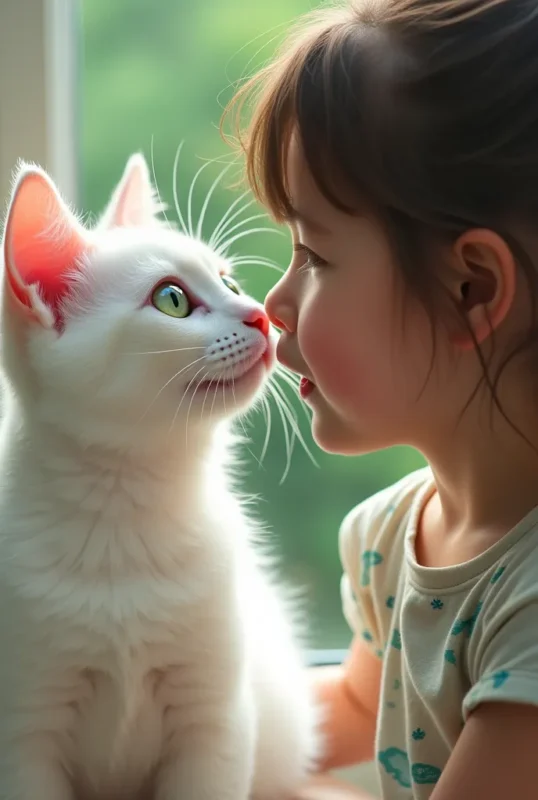Introduction
The relationship between humans and animals has evolved significantly, especially in the past few decades. As technology advances, artificial intelligence (AI) is revolutionizing pet care, while the ancient practice of animal telepathic communication offers profound insights into our furry companions’ emotions and thoughts. This article explores both realms, emphasizing how they can enhance the pet ownership experience, providing a holistic approach to understanding and caring for our animals.
Understanding AI in Pet Care
The Rise of AI Technology in Pet Care
Artificial intelligence is transforming how we interact with and care for our pets. From smart collars that monitor health to automated feeding systems, AI-powered gadgets are making pet care more efficient and insightful. These technologies can track vital signs, dietary habits, and even behavioral patterns, offering pet owners unprecedented access to their pets’ health and well-being.
Smart Collars and Health Monitoring
One of the most notable innovations is the smart collar, equipped with sensors to monitor a pet’s health metrics. Devices like the Invoxia Smart Dog Collar provide real-time tracking of a dog’s heart rate, activity levels, and sleep patterns. This data can help owners identify potential health issues before they become severe, allowing for timely veterinary intervention.
AI-Powered Pet Cameras
AI-powered pet cameras have also become increasingly popular. These devices not only allow pet owners to monitor their pets while away but also provide features like two-way audio and treat dispensing. For example, the Eufy Pet Dog Camera uses AI to follow pets around the room, ensuring that owners can see their furry friends at all times.
Automated Feeding Solutions
Automated feeding devices represent another significant advancement in AI pet care. These gadgets can dispense precise portions of food at scheduled times, ensuring pets receive the right amount of nutrition, even when their owners are not home. Some models can even be controlled remotely via smartphone apps, allowing for flexibility in managing feeding schedules.
Behavioral Insights and Training
AI technology can also aid in training pets. Interactive toys and devices that adapt to a pet’s behavior can help address behavioral issues while keeping pets mentally stimulated. These toys often come with apps that track a pet’s progress, enabling owners to tailor their training strategies accordingly.
The World of Animal Telepathic Communication
What is Animal Telepathic Communication?
Animal telepathic communication is the ability to intuitively connect with animals beyond verbal language. Practitioners believe that animals can convey their thoughts, feelings, and needs through images, emotions, and sensations. This practice is based on the premise that all living beings are interconnected through energy and that communication can occur without spoken words.
The Role of Animal Communicators
Animal communicators are individuals who claim to have the ability to understand and interpret the messages that animals send. They often use techniques such as meditation and visualization to establish a connection with the animal’s energy. By tuning into this energy, communicators can gain insights into an animal’s emotional state, desires, and even physical discomfort.
Benefits of Animal Telepathic Communication
- Understanding Behavioral Issues: Many behavioral problems in pets stem from stress, anxiety, or past trauma. By communicating with the animal, communicators can identify the root causes of these behaviors and suggest appropriate interventions.
- Strengthening Bonds: Telepathic communication can enhance the bond between pets and their owners. When owners understand their pets’ needs and emotions, they can respond more effectively, leading to a deeper, more trusting relationship.
- Health and Wellness Insights: Animal communicators can often perceive when an animal is unwell or in pain, even before physical symptoms manifest. This proactive approach can lead to earlier veterinary consultations and better health outcomes.
Merging AI and Telepathic Communication
A Holistic Approach to Pet Care
The combination of AI technology and animal telepathic communication can create a comprehensive approach to pet care. While AI provides data-driven insights into a pet’s physical health, telepathic communication offers a deeper understanding of their emotional and mental well-being. This holistic approach allows pet owners to cater to their animals’ needs more effectively.
Real-Life Applications
- Enhanced Health Monitoring: By using AI tools to track physical health and communicating telepathically with pets, owners can identify potential health issues and emotional distress simultaneously, leading to more informed care decisions.
- Behavioral Management: AI can help monitor and analyze behavioral patterns, while telepathic communication can provide insights into the reasons behind these behaviors. This synergy can guide owners in implementing effective training techniques.
- Tailored Wellness Plans: Combining the data from smart devices with insights gained from telepathic communication allows pet owners to create customized wellness plans that address both physical and emotional health.
The Future of Pet Care
Innovations on the Horizon
As technology continues to advance, we can expect further innovations in both AI pet care and animal telepathic communication. Future AI tools may incorporate advanced machine learning algorithms to provide even deeper insights into animal behavior and health.
Increasing Awareness and Acceptance
The acceptance of animal telepathic communication is gradually growing, with more pet owners exploring its benefits. Workshops and sessions led by experienced communicators are becoming more popular, providing a platform for people to learn about this practice.
Conclusion
The integration of AI technology and animal telepathic communication represents a transformative approach to pet care. By leveraging data-driven insights and intuitive understanding, pet owners can provide a holistic and fulfilling life for their companions. Embracing both these methodologies opens up a world of possibilities, enhancing our bond with our pets and ensuring their health and happiness.

